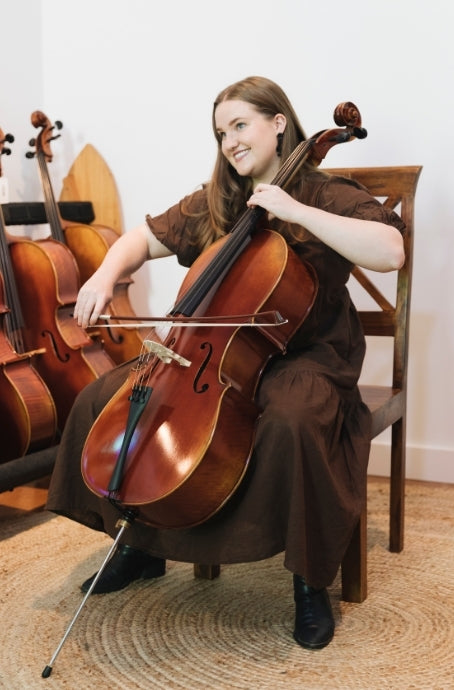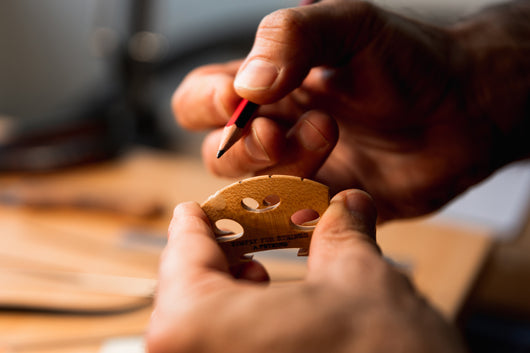Cello Rosin
Cello Rosins from world-renowned brands. Authorised Stockist.
Unlock the Full Potential of Your Instrument with the Perfect Cello Rosin
As the bridge between bow and string, cello rosin holds the key to unleashing the rich, resonant tones that define your musical performance. It is a vital accessory for cellists, and at Simply for Strings, we offer only the best cello rosins from leading brands like Cecilia, Leatherwood, Bernardel, and Melos, catering to musicians of all levels and genres. Whether you're a beginner or a seasoned performer, finding the perfect rosin can make a noticeable difference in your playing experience. Explore our comprehensive accessory collection
.The Essential Role of Cello Rosins
Cello rosin plays a vital role in every cellist's musical expression, providing the necessary friction between the bow and the strings to produce a clear and resonant sound. Without rosin, the bow would simply glide across the strings, resulting in a weak, airy tone.
When applied correctly, rosin adheres to the bow hair, creating a microscopic layer that grips the strings as the bow is drawn across them. This friction allows you to produce accurate, sustained notes, articulate passages with precision, and enrich your playing with emotion and nuance. The purpose of cello rosin is to enhance control, facilitating a seamless connection between performer and instrument and allowing for greater expression and musicality in your playing.
Choosing the Best Rosin for Your Cello
Cello rosin comes in various formulations, each offering a unique blend of grip, texture, and tonal characteristics, catering to cellists' diverse needs and preferences. You should consider your playing style, the specifics of your cello, and the sounds you are striving to achieve.
Dark Rosin for Cello Playing
Dark rosins like those from Pirastro and W.E. Hill & Sons are softer and stickier, making them ideal for cellists seeking a warm, rich tone. They provide excellent grip and traction on the strings, allowing smooth bowing and sustained notes. Dark cello rosins are particularly well-suited for players of classical and romantic repertoire, where a deep, powerful sound is desired.
Light Rosin for Cello Playing
On the other hand, if you are looking for a brighter, more focused tone with enhanced clarity and articulation, light rosins, like those from D'Addario, Melos, and Gustave Bernardel, could be the best choice. They are harder, less sticky, and more popular among cellists who play in ensembles or genres requiring precision and agility. Light cello rosins are less likely to melt, making them more suitable for warmer and humid climates.
Expert Help for Choosing the Best Cello Rosin
Whether you're a classical virtuoso, a jazz improviser, or a folk enthusiast, the choice of rosin for the cello will significantly impact your performance. If you're unsure where to start, our team of expert players and teachers at Simply for Strings is here to help. We want every musician to be confident and comfortable when playing, and with our tailored recommendations, you will easily find the perfect rosin for your cello.
Complete Your Cello Outfit with Premium Accessories from Simply for Strings
At Simply for Strings, we're passionate about helping cellists of all levels reach their full potential. Whether you're just starting or perfecting your skills as a professional, we're here to provide the support and resources you need for success.
In addition to rosins, we offer a comprehensive collection of other cello accessories to support your musical journey. We have everything you need, from endpin stoppers and music stands to mutes and humidifiers to enhance your playing experience and keep your cello in top condition. Furthermore, we carefully select every product and check for its quality and reliability so you can shop with confidence, knowing you're getting the best accessories for your instrument.
Explore our cello rosins and accessories collection today and find quality instruments to support your playing journey.
What is rosin?
Rosin is a solid form of tree resin that’s obtained from pines and other conifers. It’s semi-transparent and varies in colour from yellow to black. It’s used by musicians and luthiers to improve the sound quality of a stringed instrument. Rosin creates friction between the bow hair and the strings, as well as helping the bow grip the strings to produce the sound. If you don’t use enough rosin on the bow, your instrument will have an airy or scratchy sound when you play.
How do I apply rosin to the bow?
It’s important to ensure you don’t put too much or too little rosin on your bow. To make sure you get the right amount, first tighten your bow and press down the bow hair onto the rosin. The movement you need to use is straight up and down. If the bow is brand new, you'll need between 10-20 strokes up and down the full length of the bow to ensure there is enough friction created. If your bow is pre-rosined, you should only require 2-3 strokes per practice session. Lots of dust on your instrument indicates there is too much rosin.
Should I use light or dark rosin on my cello bow?
Light rosins are used in high temperatures (summer), for smooth solo play or if you’re playing your instrument in chamber music. The light ones are most commonly used by violin and viola players. On the other hand, dark rosins are used in low temperatures (winter) for playing your instrument in an orchestra or for full-tone playing. This one is most commonly used by cello and double bass players. One of the biggest differences when you use rosin is that darker rosins are heavier and stickier. This makes them better for maintaining your strings of larger instruments. Light rosins are lighter in color, density and stickiness therefore more suited for maintaining your strings of smaller instruments. We recommend trialling both types to find the sound you prefer best.
Why is there a big price difference between different rosins?
Generally, as you pay more for a rosin, higher quality materials are used in their manufacturing process. More expensive rosins will be less scratchy and have a smoother sound. Some rosins also have special additives to them that will effect the sound such as the Larica Gold rosin has gold particles in the rosin, while others are designed to work better with certain sets of strings such as Pirastro's line of rosins. One of our most popular professional level rosins, the Leatherwood rosin is a bespoke rosin handmade in Australia. This rosin is specifically designed to work best with Australia's climate and humidity whereas most other rosins were designed with European or American climates in mind.
Which student rosin would you recommend?
We would recommend looking at the Hidersine Junior and Hidersine Deluxe rosins for the beginner player. These are rosins that most schools have suggested their students get and were on the majority of their book packs. For the highschool/intermediate player, we would suggest looking at the Gustave Bernardel or the Melos rosins. These rosins are the next level up and are excellent in terms of price vs quality.













